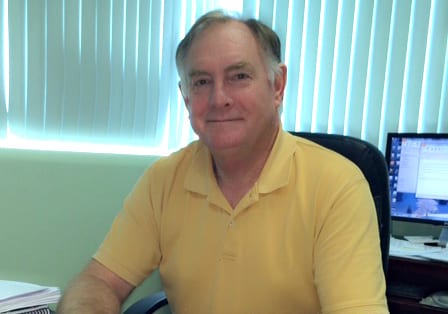How Ron Hart Paid Off $29,000 in Credit Card Debt
The average American family with credit card debt owes $15,191, which made Ron Hart an above-average American for the last six years.
He gladly surrendered this status last September.
That’s the day Hart made the final payment on $29,000 of credit card debt that gave him the above average standing he really didn’t want.
“The shackles are finally coming off,” Hart said, triumphantly. “Debt has had me locked up for so long and caused me so much stress that I can’t wait for September 1. That is going to be a very good day in my life.”
That sort of optimism has been missing since 2008. Back then, there may not be such a thing as a perfect life, but you would have had a hard time convincing Hart.
He was just barely into his 50s and still in good enough shape to referee high school basketball games four nights a week. He was a single Dad with two teenage daughters, both stellar high school students whose only problem was deciding what college to attend.
And he was the distribution manager for a building supply company in the Miami-Fort Lauderdale area that serviced a housing industry at the tail end (they didn’t know it!) of a decade-long run of prosperity. Raises, bonuses and good times were all they knew.
Then Hart ran into one of those stages of life you’re only supposed to read about. In 2008, he suffered a heart attack and so did the economy in South Florida.
He spent five days in the hospital and was out of work for another month recovering. The economic slump lasted a whole lot longer, dragging so much of South Florida’s housing industry underwater that you needed fins and air tanks to get to work.
The combination of medical bills and lost income pulled the financial floor out from under Hart. He already had a mortgage, but took out two loans against his 401(k) program to try and keep up with the medical bills. When that didn’t work, he started charging everything to credit cards.
“Our bonuses went from pretty healthy to nil overnight,” Hart said. “As far as raises, we either didn’t get one or, if we did, it was minimal. I tried to keep up, but one day I sat down at the table, looked at all the bills and cried ‘Uncle!’ I give up!”
The $29,000 in credit card debt was spread over three cards. They carried interest rates of between 18 and 20 percent. Hart could no longer afford the minimum payments.
Hart went to the employee assistance program at work and they gave him two numbers to call for help. He tried the first number and after telling his story, the person on the other end of the line told him there was no way out, he should just declare bankruptcy.
“I know that bankruptcy is all some people can do, but that’s not me,” Hart said. “I borrowed that money, I owed that money and I was trying to find a way to pay it back.”
A Credit Counseling Solution: Debt Management Program
He called the second number and got the answer he was looking for. A credit counselor from InCharge Debt Solutions asked some questions about his financial situation and recommended a debt management program.
Benefits of a DMP include lowering the interest rates on credit cards and consolidating all bills into a single monthly payment. The interest rate on Hart’s cards dropped to just six percent, meaning his monthly payments actually attacked the principal balance.
That wasn’t even his favorite move in the program. He liked the fact that the DMP deducted the money automatically from his checking account every month. It helped add discipline to his bill paying.
“My girls have things come up and there are things I need to fix around the house and other places I could send the money,” Hart said. “If I’m sitting there making the decision at my table every month, I could see where I might set the check (for the DMP) aside and use that money on the girls or the house.
“I can’t do that with automatic withdrawal. I had to be disciplined about having the money in my account on the first of every month. That really helped me keep on track.”
The September 1 celebration included a sendoff for his oldest daughter, who graduated with a degree in molecular biology from the University of Florida and received a full scholarship for a doctorate program at the University of Glasgow in Scotland. His other daughter still has two years to go at Savannah College of Art and Design.
“I’m not there yet, but already I can feel a sense of relief and accomplishment,” Hart said. “I hope I can look back at this time of my life and see the lessons I learned and use them to assist others. I wouldn’t want anyone to experience this kind of stress in their life.”
Sources:
- Tim (2015, April) American household Credit Card Debt Statistics: 2015. Retrieved from http://www.nerdwallet.com/blog/credit-card-data/average-credit-card-debt-household/

